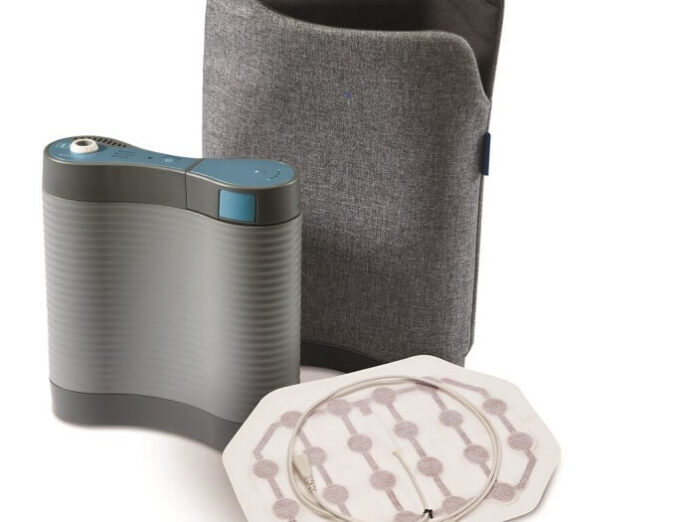In a groundbreaking development for lung cancer therapy, the FDA has approved Novocure’s Optune Lua, a wearable medical device that employs electric fields to destroy cancer cells. This innovative device is now available for adults with metastatic non-small cell lung cancer (NSCLC) who have experienced disease progression after platinum-based chemotherapy.
Based in Root, Switzerland, Novocure will market the Class 3 medical device, which generates alternating electrical fields known as “Tumor Treating Fields” (TTFields). These electrical signals are transmitted through wearable arrays placed directly on the skin, applying physical forces to the electrically charged components of dividing cancer cells, thereby killing them. According to Novocure, healthy cells remain largely unaffected by TTFields. The device is designed for use approximately 18 hours a day.
Optune Lua is intended to be used in conjunction with either a checkpoint inhibitor immunotherapy or the chemotherapy drug docetaxel, the combination of which was tested in clinical trials. Phase 3 trial results revealed a statistically significant and clinically meaningful extension of median overall survival by 3.3 months compared to cohorts receiving only a checkpoint inhibitor or docetaxel. Specifically, patients using Optune Lua alongside a checkpoint inhibitor achieved a median overall survival of eight months longer than those on the checkpoint inhibitor alone. Meanwhile, the combination of Optune Lua and docetaxel extended median survival by two months over docetaxel alone, although this was not statistically significant.
While the device’s use was associated with some adverse events, primarily skin-related issues under the electrodes, these events were mostly low-grade, with only 4% of participants experiencing severe reactions that required treatment interruption.
Dr. Ticiana Leal, the primary investigator of the LUNAR Phase 3 study, emphasized the importance of this advancement in a disease that typically progresses rapidly and offers limited treatment options. “The overall survival results observed with Optune Lua mark the first significant improvement in over eight years for this patient population, and its lack of systemic toxicity makes it a compelling option for patients and their healthcare providers,” stated Dr. Leal, who leads the thoracic oncology program at the Winship Cancer Institute of Emory University School of Medicine.
This FDA approval builds on Novocure’s history with TTFields technology, which first gained traction as a treatment for glioblastoma multiforme in 2011. The device, now known as Optune Gio, has also been previously approved for use in malignant pleural mesothelioma under a humanitarian device exemption.
As reported by medcitynews, the approval for Optune Lua in advanced NSCLC presents a significant opportunity for revenue growth, addressing a far more common cancer type. Analyst Jonathan Chang from Leerink Partners noted that while uncertainties remain regarding TTFields’ position in the NSCLC treatment landscape, there is potential for substantial revenue generation from this indication.
Future growth prospects for Novocure include expanding the approved uses of TTFields technology. The company recently reported positive Phase 3 data for NSCLC patients with brain metastases and is also evaluating the device’s effectiveness in treating pancreatic cancer in collaboration with Roche. Additionally, a Phase 3 trial is underway assessing TTFields in conjunction with radiation and chemotherapy for glioblastoma, with preliminary data expected in 2026. Chang acknowledged the risks involved but highlighted the positive track record of TTFields in successful trials and approvals, indicating potential for meaningful expansion in future applications.
























